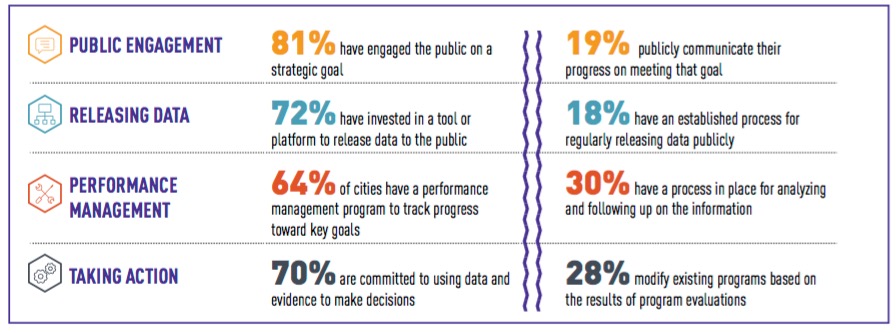EXECUTIVE SUMMARY
Unlocking the potential of data and evidence to inform decision making is key to ensuring cities thrive in the 21st century. Through What Works Cities’ early efforts, we’ve learned that cities across the country are sold on the value of using data and evidence to make informed decisions for their communities; the demand is robust. But a wide gap exists between cities’ desire and their ability to implement evidence-based practices. This brief quantifies cities’ current practices around the use of data, based on an analysis by The Bridgespan Group of What Works Cities applicants. The analysis is focused on information from the 39 cities visited by What Works Cities and supported by surveys from all 115 applicant cities. Consider that 81% of cities have engaged the public on a strategic goal, yet only 19% of cities publicly communicate their progress towards meeting that goal. And while 70% of cities are committed to using data and evidence to make decisions about city programs, only 28% modify existing programs based on the results of data and evaluations.

Cities are telling us that they need tools and expertise to close the gap between their intention to use data in decision making and their actual capacity to do so. The good news is that resources and best practices in this work are advancing every day. WWC is preparing cities for success by establishing a roadmap for doing this work, providing strategic guidance and specific tactics for helping cities overcome hurdles, and deepening cities’ culture of using data and evidence. This roadmap, the WWC standard, defines steps local leaders can take to create a strong foundation for using data and evidence effectively within city government. Experience and evidence show that when cities from Jackson, MS to Las Vegas, NV have the resources, tools, and expertise to effectively execute on data, they are able to increase the effectiveness of government and improve residents’ lives. What Works Cities is excited to engage with local leaders to advance practices in all cities and realize a brighter future for residents around the country.